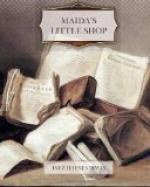“We sent out over five hundred invitations, I believe. But not quite four hundred accepted.”
“Four hundred,” Laura repeated. “Goodness, what could so many children do?”
“Oh, there were all sorts of things for them to do,” Maida answered. “There was archery and diabolo and croquet and fishing-ponds and a merry-go-round and Punch and Judy on the lawn and a play in my little theater—I can’t remember everything.”
Laura’s eyes had grown very big. “Didn’t you have a perfectly splendiferous time?” she asked.
“No, not particularly,” Maida said. “Not half such a good time as I’ve had playing in Primrose Court. I wasn’t very well and then, somehow, I didn’t care for those children the way I care for Dicky and Rosie and the court children.”
“Goodness!” was all Laura could say for a moment. But finally she added, “I don’t believe that, Maida!”
Maida stared at her and started to speak. “Oh, there’s the clock striking four?” was all she said though. “I must go. Thank you for dancing for me.”
She flew into her coat and hat. She could not seem to get away quick enough. Nobody had ever doubted her word before. She could not exactly explain it to herself but she felt if she talked with Laura another moment, she would fly out of her skin.
----------------------
“Mother,” Laura said, after Maida had gone, “Maida Flynn told me that her father gave her a birthday party last year and invited five hundred children to it and they had a theater and a Punch and Judy show and all sorts of things. Do you think it’s true?”
Mrs. Lathrop set her lips firmly. “No, I think it is probably not true. I think you’d better not play with the little Flynn girl any more.”
----------------------
The next afternoon, Maida went, as she had promised, to see Dicky.
She could see at a glance that Mrs. Dore was having a hard struggle to support her little family. In the size and comfort of its furnishings, the place was the exact opposite of the Lathrop home. But, somehow, there was a wonderful feeling of home there.
“Dicky, how do you manage to keep so clean here?” Maida asked in genuine wonder.
And indeed, hard work showed everywhere. The oilcloth shone like glass. The stove was as clean as a newly-polished shoe. The rows of pans on the wall fairly twinkled. Delicious smells were filling the air. Maida guessed that Dicky was making one of the Irish stews that were his specialty.
“See that little truck over there?” Dicky said. “That helps a lot. Arthur Duncan made that for me. You see we have to keep our coal in that closet, way across the room. I used to get awful tired filling the coal-hod and lugging it over to the stove. But now you see I fill that truck at the closet, wheel it over to the stove and I don’t have to think of coal for three days.”
“Arthur must be a very clever boy,” Maida said thoughtfully.




